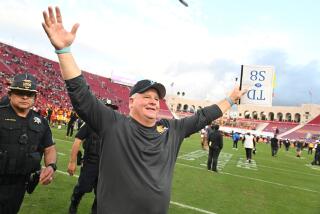ANALYSIS / THE BILLS’ OFFENSE : Kelly Directs From a Front-Row Seat
- Share via
ATLANTA — There’s a good reason the Buffalo Bills have become the only team in the game’s 28-year history to reach the Super Bowl four times in a row: They have the NFL’s only on-field play caller, Jim Kelly.
As veteran center Kent Hull said when asked about the January playoff surge that has advanced the Bills again, “Jim put us in the right play at the right time.”
Only a quarterback can do that consistently. The coaches calling the signals for the other teams, standing on the sidelines or sitting upstairs are too far removed from the battlefield.
Their computers are formidable. When an offensive coach shows up at game time with his computer script--which identifies the precise call to make in any and all crises--he knows everything.
He knows all there is to know--that is, as of Friday morning, when he prints it out.
At game time, the situation begins to change in the opening minutes, when an offensive guard, say, or defensive tackle departs with a little injury; or when it becomes clear that a feared opponent isn’t quite up to his game, for whatever reason.
Kelly is instantly aware of such changes. He can adjust as soon as the next play. A play-calling coach might adjust for the next series.
And so the matchup in the Georgia Dome on Sunday is man against computer.
That isn’t the same as saying that Kelly definitely will win. Play-callers can do only so much. And Kelly’s opponents, the Dallas Cowboys, are still the NFL’s best team.
In the 28th Super Bowl, though, the Cowboys will be laboring under three disadvantages:
Unlike last year--and unlike all previous Super Bowl winners--their very best players are beaten up physically: Quarterback Troy Aikman has a head injury, running back Emmitt Smith a shoulder injury, pass rusher Charles Haley a back injury and two other Dallas starters can’t even suit up.
Second, the psychology of any rematch is always against the team that won last time--and in last year’s Super Bowl, Dallas beat Buffalo by five touchdowns.
Finally, the Cowboys, who were obliged to reach their season’s peak last week to defeat the San Francisco 49ers, can be expected to cool off a little, or maybe a bunch.
Even so, Kelly will have a chance to win only if it turns out that his linemen can handle Dallas’ linemen.
That is the question of the game.
For, at 33, on bad knees, Kelly is kind of a statue now. He needs a lot of protecting--and he didn’t have it last year.
If that changes for the better, Kelly can make it close, at least for a while, because of the kind of quarterback he is.
Said Hall of Famer Joe Namath, who is here to toss the coin Sunday: “When you call your own plays, an offensive lineman can make you look like a genius when he comes back to the huddle and says: ‘The guy across from me is getting tired. We can run ’34 blast’ right at him.’ ”
That is Kelly’s edge.
The clubs Buffalo beat this season to get this far had more rigid standards. Their game plans, after passing through the computer, focused on the highest-percentage play on any given down.
The trouble with making such calls repeatedly is that, in any given situation, everyone, including the opposition, knows what the highest-percentage play is.
Kelly prospers, by contrast, as a loner.
Sometimes nobody, including Kelly, is able to remember precisely why he made some of his best calls.
You can take it for granted that his team wouldn’t have been here once, let alone four times, if Kelly hadn’t seized control of Buffalo’s offensive communications four years ago.
It was midway through the 1990 season that he discovered how to keep the Bills out of their plodding, run-dominated offense, which strongly resembled most other NFL offenses.
His secret? A shotgun stance.
The Buffalo coaches had always let him call the plays in the shotgun formation--which was also their fast-break, two-minute offensive formation--so he simply stayed in the shotgun, play after play, game after game.
“When you have total control of the offense, it’s a big plus,” Kelly said again this week.
Kelly’s offensive direction helped the Bills through Super Bowl XXV, when they lost to the New York Giants only on a missed field goal, 20-19, but they have been going downhill in every Super Bowl since.
In game XXVI, during a battle of one-back teams, the Washington Redskins--introducing a counter play--could run in both directions. But Buffalo couldn’t, and Kelly attempted a Super Bowl record 58 passes in a vain attempt to forestall a 37-24 setback.
By game XXVII, the Bills had a counter play, having learned it from the Redskins, but they ran into a Dallas power plant that took the ball away nine times and scored seven touchdowns, 52-17.
This time around, Kelly might get it all together.
It’s all still on his shoulders.
“It’s kind of like the president of the United States,” Hull said. “If the economy goes to hell, he’s to blame.”
More to Read
Go beyond the scoreboard
Get the latest on L.A.'s teams in the daily Sports Report newsletter.
You may occasionally receive promotional content from the Los Angeles Times.










